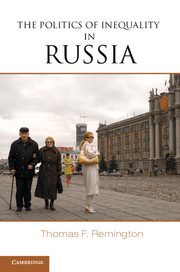Book contents
- Frontmatter
- Contents
- List of Figures
- List of Tables
- Preface
- 1 The Political Sources of Income Inequality in Russia
- 2 Employment, Earnings, and Welfare in the Russian Transition
- 3 Regime Diversity in the Russian Regions
- 4 Democracy and Inequality in the Russian Regions
- 5 Regional Regimes and the Labor Market: Evidence from the NOBUS Survey
- 6 Helping Hands or Grabbing Hands? Government-Business Relations in the Regions
- 7 Accounting for Regime Differences
- 8 After the Crash
- Index
- References
2 - Employment, Earnings, and Welfare in the Russian Transition
Published online by Cambridge University Press: 05 June 2012
- Frontmatter
- Contents
- List of Figures
- List of Tables
- Preface
- 1 The Political Sources of Income Inequality in Russia
- 2 Employment, Earnings, and Welfare in the Russian Transition
- 3 Regime Diversity in the Russian Regions
- 4 Democracy and Inequality in the Russian Regions
- 5 Regional Regimes and the Labor Market: Evidence from the NOBUS Survey
- 6 Helping Hands or Grabbing Hands? Government-Business Relations in the Regions
- 7 Accounting for Regime Differences
- 8 After the Crash
- Index
- References
Summary
To understand the effect that Russia's transition had on incomes, we must appreciate how closely tied incomes and benefits were to employment in the Soviet system. It has often been observed that the Soviet “social contract” rested on a tacit bargain: The regime provided effectively full employment at modest and relatively equal wages and a comprehensive system of social benefits in return for worker quiescence. To the extent there was such an implicit social contract – as we will see from further discussion, this remains a matter of controversy – it rested on the fact that not only earnings but many kinds of social provision as well were embedded in the employment nexus. Moreover, much of the income that Soviet citizens earned through their place of employment was nonmonetary. Wages and pensions, and some other social benefits, were paid in cash, but cash could buy relatively few goods and services – at least legally. Nonmonetary, administratively allocated benefits replaced market transactions for producing and distributing many basic goods and services. Education and health care were universally available public services, funded through the state. Beyond them, the system of public welfare comprised extensive nonmonetary benefits including free or discounted access to goods and services such as housing, transportation, recreation, medications, and food. To a large extent, many of these goods and services were distributed through the workplace.
- Type
- Chapter
- Information
- The Politics of Inequality in Russia , pp. 35 - 76Publisher: Cambridge University PressPrint publication year: 2011



